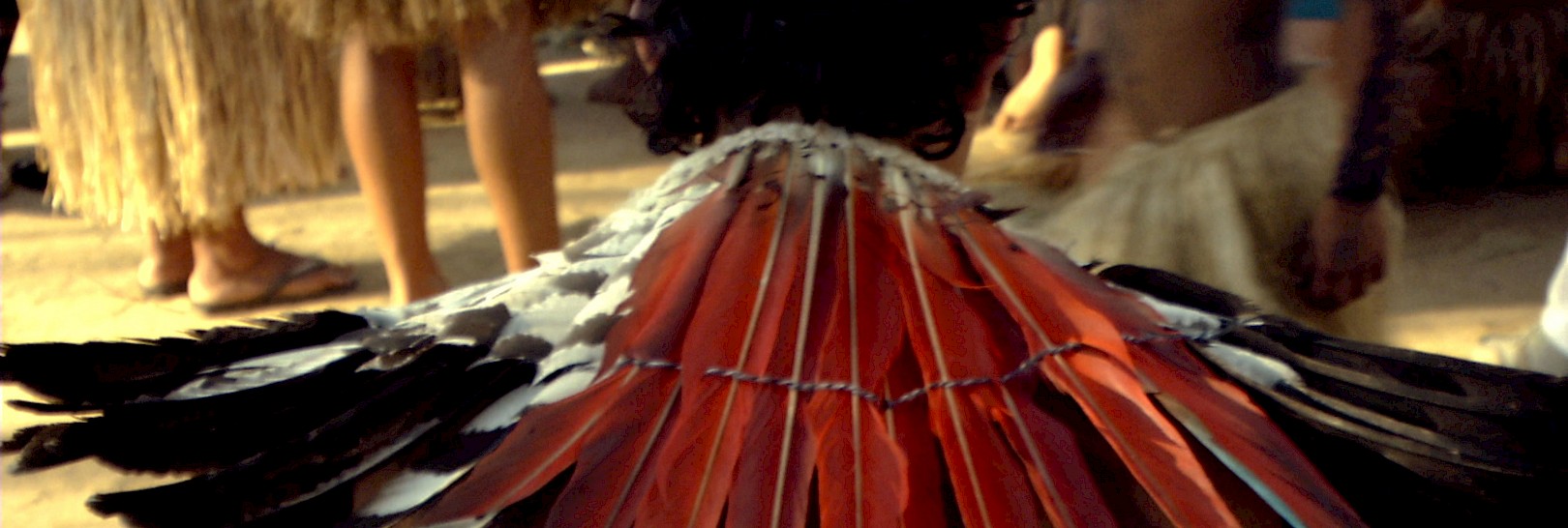Povo Yawanawá
42:10
The Yawanawá people. Chief Bira Yawanawá . Gregório Rosário Indigenous lands. Acre state. Population of at least 1000 inhabitants
Album
The Yawanawá People
Sucking on an anaconda’s heart (Sucuri), knocking down a beehive, abstaining from sex and ingesting Ayahuasca, pepper, and snuff tobacco (Rapé).
These are some of the many activities involved in the formation of a spiritual leader – the shaman – among the Yawanawá people living in Acre state, in the north of Brazil. Their first contact with white men took place just a few generations ago. But the group, comprised of about a thousand Indians, already emerges as one of the leaders in the subject of spirituality in Brazil, due to the dissemination of their healing chants and prayers.
“I don’t talk about religion.
I talk about spirituality because it’s sacred and sovereign:
It has no color, no race, no language ”
Cacique Bira Yawanawá

The Shuãnka, a Yawanawá prayer, the puff and the xinava – when the praying healer ingests Ayahuasca and makes wishes over a potful of caiçuma made from cassava that the sick will drink later – are some of the most widely known techniques of the shamanic healing of this people. The diagnoses and the prescription for disease treatment are established from analyzing the patient’s last dream before getting sick.
From a frog that likes to make his home close to the igapós, on trees or on the ground, close to the water or firmly on land… The Yawanawá extract a poison that can be applied as a stimulant and very powerful remedy: Kambô, which firstly causes vomiting and sweating, but later cleanses the body – and the spirit – from any settled afflictions.
Healing and sacredness are also synonyms of arts for the Yawanawá: pottery, basketry, and body paintings with urucum and jenipapo are most widely displayed during the spiritual rituals. Dried buriti skirts, headpieces, and bracelets: this is how the Yawanawá present themselves in one of their main festivities, the Mariri festival. Celebrated overnight and open to the neighboring peoples as well as guests from all over the globe, it is a grand dancing and singing circle embroidering stories from this people’s vision of the world, one achieved by means of the spiritual language, by drinking Ayahuasca.

As the protector of his people’s knowledge, cacique Bira is respected throughout Brazil and the world for reclaiming and unveiling the indigenous knowledge from his village, which he named Nova Esperança (New Hope). It is he who makes sure his lands are not touched by the great evils: television and alcoholic beverages.
“We were never called Yawanawá,
we were called caboclo,
a word that means “of no origin” in Brazil,
used for us, the children of the land?”
Cacique Bira Yawanawá
One of the first to leave for the city, seventeen-year-old Bira went to Rio Branco, Acre’s capital, for his studies: he hadn’t yet seen lamp-posts, cars, or shop windows. Impressed with the technology of the white man, Bira also became acquainted with his people’s rights – regarding his land, his culture, and his way of life. At eighteen, he already was an active participant of the Brazilian Indigenous Movement, and by 1992, when he attended the Rio de Janeiro Earth Summit (Eco-92), he’d already visited many cities in Latin America for lectures and debates.
Back then, Bira aspired to be a scholar, an anthropologist: the years of endured prejudice had implanted a type of shyness in him, something to do with being “only” an Indian. Little by little, from all his roaming across a white world, a stronger sense of self-knowledge and self-esteem caused him to understand: he already was and had always been everything he’d ever needed to be, a Yawanawá.

Ten years after leaving for the city, he returned with the intention of strengthening his people with everything he’d learned. In a region devoid of painful and violent energies from a past of semi-slavery during the rubber extraction boom, he built Nova Esperança, in the village where he now lives and works in teaching his relatives to speak with “the great wise men who came by way of water”.
“We’ll bring our culture to the academic world
With respect and dignity
We’ll carry a message of humanity to the scientific world”
Cacique Bira Yawanawá
Bira helped raise what he calls the most prepared generation of Brazilian Indians, which includes some of his children: there are over twenty scholars, including four doctors, to this day.
Aware of their capabilities and strengthened in their origins, the young Yawanawá are connected with the world as a whole and have had the opportunity to learn how to express their ideas in any occasion. And they’ve done it without compromising their culture or customs. They are health professionals who can prescribe what we find in drugstores or in the forest, they are specialists who read books and can chant healing songs.

“We can’t grow old and not leave a legacy upon this land,
not leave our footsteps on this earth”
Cacique Bira Yawanawá
A common ground amongst them all: the freedom to come and go through whatever path they choose, the reassurance of a home located close to one of the largest freshwater reserves in the world. The more they walk, the more they dream that the best fruit they’ll ever reap lies in the shade of a forest so great, it is Amazonic… Their harvest will be shared with a global village in search of wisdom, where hidden frogs hold the poison to free us, and grandmothers blow the wind to embrace us. Dream = future, Yawanawá dictionary.
interview
Bira Yawanawá (part 1)
10:14
interview
Bira Yawanawá (part 2)
03:35
interview
Tashka Yawanawá
08:24
Outtakes
Night song for the Yawanawá
05:12
